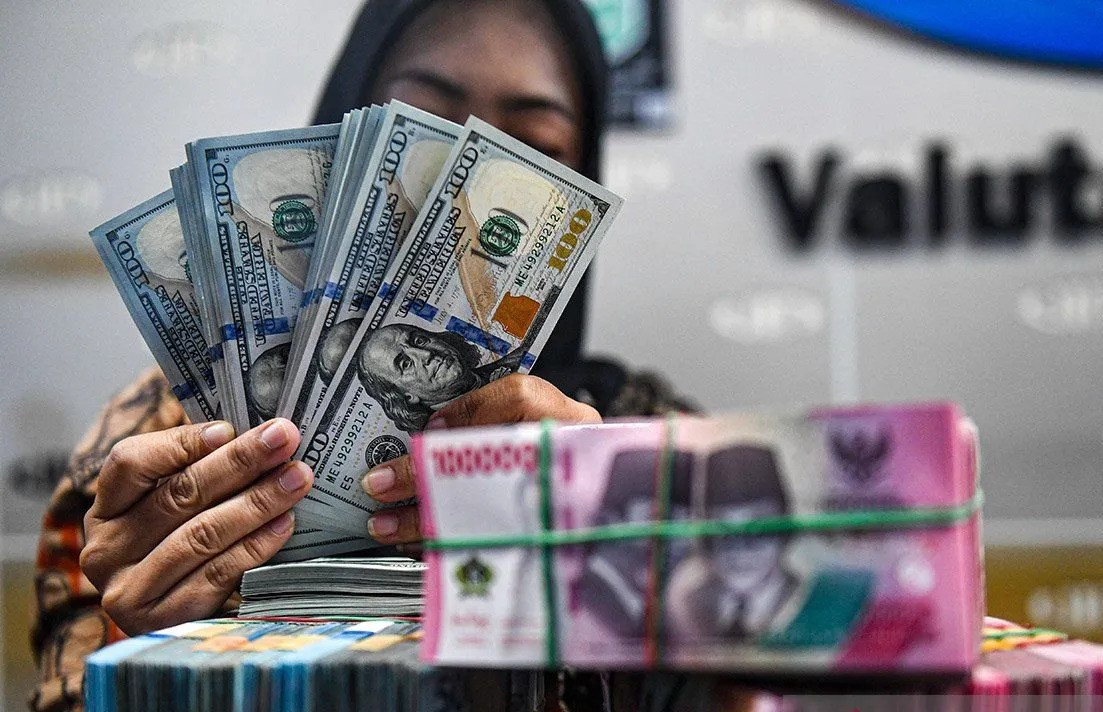Popular Reads
Top Results
Can't find what you're looking for?
View all search resultsPopular Reads
Top Results
Can't find what you're looking for?
View all search resultsDollar slips as investors seek safe havens after US tariffs
Change text size
Gift Premium Articles
to Anyone
T
he dollar slid broadly on Thursday and the euro firmed after President Donald Trump announced more aggressive-than-expected tariffs against US trading partners, jolting the markets as investors sought safe havens such as the yen and Swiss franc.
The highly anticipated tariff announcement sent shock waves through markets, with global stocks sinking and investors scrambling to the safety of bonds as well as gold.
Trump said he would impose a 10 percent baseline tariff on all imports to the United States and higher duties on some of the country's biggest trading partners. The tariffs will take effect on April 9 and appeared to target about 60 countries.
The new levies ratchet up a trade war that Trump kicked off on his return to the White House, rattling markets as fears grow that a full-blown trade war could trigger a sharp global economic slowdown.
The Trump administration has already imposed tariffs on aluminium, steel and autos, as well as increased duties on all goods from China.
"The markets are in risk-off mode and pricing in weaker global economic growth," said Kyle Rodda, senior financial market analyst at Capital.com.
"The issue for markets in the coming days will be clarifying whether there's scope for trading partners to re-negotiate these tariffs and whether there is the risk further trade restrictions are possible from here."
The risk-sensitive Australian dollar fell 0.4 percent to $0.6274, while the New Zealand dollar slipped 0.12 percent to $0.5738.
The new duties left investors scrambling for shelter in traditional safe havens: the Japanese yen and the Swiss franc. The yen strengthened nearly 1 percent to 147.99 per dollar, while the Swiss franc was stronger at 0.87815 per dollar.
"Safe haven trades in the wake of the announcement will include the Japanese yen most definitely," said John Hardy, chief macro strategist at Saxo Bank.
"Treasuries can be a safe haven, especially at the short end of the yield curve, I think would be the two chief trades. But even the longer-term Treasuries could do well."
Benchmark 10-year Treasury yields shot down 14 basis points to a five-month low of 4.04 percent as investors braced for slower US growth, while interest rate futures priced in a higher chance of interest rate cuts in the months ahead.
Worries about the impact of an escalating global trade war and a slew of weaker-than-expected US data have stoked recession fears and in turn undermined the dollar this year.
US trading partners are expected to respond with countermeasures of their own that could lead to dramatically higher prices.
The dollar index, which compares the US currency against six rivals, was at 103.13, its lowest since mid-October.
The euro, meanwhile, initially surged following the tariff announcements and was last 0.63 percent higher at $1.091625. Sterling rose 0.42 percent to $1.30655.
Rodrigo Catril, senior currency strategist at National Australia Bank, said the euro's resilience is probably due to Europe focusing on supporting its economy in the face of US tariffs, rather than looking to retaliate.
"So, I think the market has liked that approach of calmness and measuredness from Europe."
There was no such reprieve for Asian currencies, with China's onshore yuan sliding to its weakest level against the dollar since Feb. 13. China's offshore yuan also hit a one-month low.
Malaysia's ringgit, South Korea's won and the Thai baht all slid against the dollar.
"Asia bears the brunt of these tariffs, with China, South Korea and Taiwan seeing significant increases compared to lower rates for LATAM (Latin America)," Ray Sharma-Ong, head of multi-asset investment solutions for Southeast Asia at Aberdeen Investments.
Elsewhere, the Mexican peso and Canadian dollar were relatively stable in Asian hours.
Canada and Mexico, the two largest US trading partners, already face 25 percent tariffs on many goods and will not face additional levies from Wednesday's announcement.











